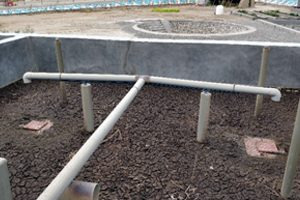
Leh, a high-altitude cold desert in India, is a popular tourist destination hosting around 250,000 visitors annually. At present, the poorly designed septic tanks and soak pits installed by households, hotels, and guesthouses to contain fecal sludge are posing a serious threat to groundwater contamination. To cater to the demand for fecal sludge management (FSM), the Municipal Committee of Leh (MCL) partnered with a private company called Blue Water Company (BWC) and a technical nongovernment organization named BORDA in 2017 to provide an end-to-end FSM service, including pit emptying and operation of a sludge treatment plant.
Prior to the new FSM service, the MCL offered an on-demand desludging service using a vacuum truck. The process of requesting this service was tedious and a single request took 2 3 weeks to fulfill. The MCL completed only 110 desludging requests in 6 years of operation. Even the demand for desludging was low. Soak pits are the popular way for containment of fecal sludge in Leh. The effluents from these pits seep to groundwater during the colder months (subzero temperatures) when most of the hotels are inactive and local households switch to dry toilets, thus reducing the need for pit emptying. In contrast, the BWC has been able to complete four desludging requests per day since the launch of the new FSM system 11 months ago. Consumers can request a desludging service by telephone, and the average time to fulfill the request is 3–4 days. The BWC receives requests from areas as far as 40 kilometers from the city center which cannot be met despite offers of additional payment.
A visit to the sludge treatment plant revealed two critical factors responsible for such a remarkable increase in demand and corresponding supply of desludging services. First, the commitment of the MCL toward the plant has enabled sustained FSM demand by providing a strong regulatory framework. For example, the license for operating a guesthouse and/or hotel is renewed only when the appropriately designed septic tanks (watertight dual tanks) have been built and the minimum requirement for desludging (once per year) has been met. During the license renewal, the MCL charges an advance fee for desludging and shares the revenue with the BWC. Such advance collection of fees ensures continued FSM demand. The MCL has also been leading the awareness-raising campaign to promote the installation of appropriately designed septic tanks by households, hotels, and guesthouses. With the same households that are involved in the tourism business beginning to realize the economic and health benefits of FSM, septic tanks are now receiving the required attention.
Second, the commitment of the employees working at the BWC in ensuring the smooth operation of the plant cannot be overlooked. The management team is readily available (even on holidays) to receive desludging requests by telephone. Whenever, a new customer calls in a request, a management team member visits the client location to assess the difficulties of the desludging process and plan accordingly. In response to the question of what drives them, one member said, “Our Leh is facing a serious water crisis, if I do not do my work properly, it [Leh] will become like Shimla [another popular tourist destination in India facing the issues of sanitation].” This strong sense of contributing for the betterment of the community has driven the BWC management team, comprised of local staff, to strive for the highest possible efficiency in service.
The success of the operations is also linked to the effective coordination at the BWC between the management team and the operational team (employees responsible for executing the desludging activity). Both teams have familiarized themselves with each step of the operation. Such thorough knowledge has enabled the management team to understand the difficulties faced by the operational team and to develop coordinating strategies. Moreover, the facilities provided by the BWC have also helped to nurture the commitment of its employees. These include clean uniforms and comfortable accommodation (including for family members). Such efforts have helped alleviate the social stigma attached to the fecal sludge desludging profession for the BWC employees. The satisfied employees are then motivated to effectively carry out their responsibilities, thus promoting both customer satisfaction and the BWC brand.
Although simple technology and reuse options have helped in maintaining the financial sustainability of the sludge treatment plant in Leh, the remarkable improvements in FSM services are owed to the strong institutional support from the MCL for the FSM demand and the strong commitment from the BWC (and its employees) for the FSM supply. The sustainability of such solutions will depend on continuous improvement in technical abilities of the plant, institutional commitment, and effective management.
Note: Information about the service operations was obtained through interviews with a member of the management team during a visit to the sludge treatment plant in Leh.







Comments are closed.